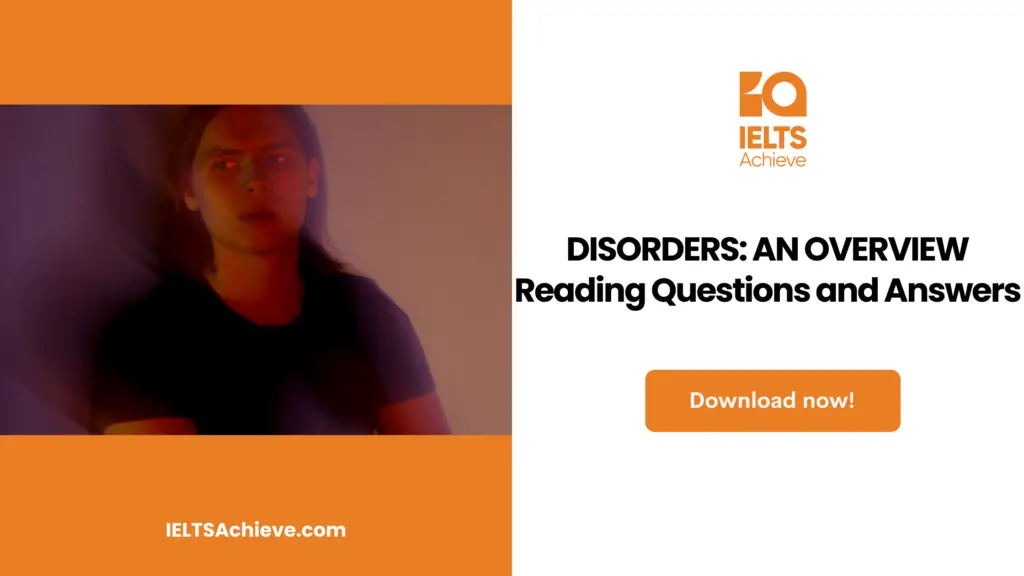The Blog post contains the following IELTS Reading Questions:
- IELTS Reading Multiple Choice Questions
- IELTS Reading Table Completion
Stay informed and prepared for success – Explore our comprehensive Reading Test Info page to get valuable insights, exam format details, and expert tips for mastering the IELTS Reading section.
IELTS Reading passage – DISORDERS: AN OVERVIEW

DISORDERS: AN OVERVIEW
Autistic Spectrum Disorder
Children with Autistic Spectrum Disorder have difficulty understanding what other people are saying, need help to play with other children, enjoy routines and find unfamiliar situations difficult. People with Autistic Spectrum Disorder can be good at creative activities like art, music and poetry. They can concentrate on one thing for a long time no they can become very good at something that they like doing.
ADHD – Attention Deficit
Hyperactivity Disorder
People with ADHD have three types of problems. Overactive behaviour (hyperactivity), impulsive behaviour and difficulty pitying attention. Children with ADHD arc not just very active but have a wide range of problem behaviours which can make them very difficult to care for and control. Those who have ADHD often find it difficult to fit in at school. They may also have problems getting on with other children. Some children have significant problems with concentration and attention, but are not necessarily overactive or impulsive. These children arc sometimes described as having Attention Deficit Disorder (ADD) rather than ADHD. ADD can easily be missed because the child is quiet and dreamy rather than disruptive. ADHD is not related to intelligence. Children with all levels of ability canhave ADHD.
Stress
Stress can be defined as the way you feel when you’re under abnormal pressure. All sorts of situations can cause stress. The most common, however. involve work, money matters and relationships with partners, children or other family members. Stress may be caused either by major upheavals and life events such as divorce, unemployment, moving house and bereavement, or by a series of minor irritations such as feeling undervalued at work or dealing with difficult children. Some stress can be positive and research has suggested that a moderate level of stress makes us perform better. It also makes us more alert and can help us in challenging situations such as job interviews or public speaking. Stressful situations can also be exhilarating and some people actually thrive on the excitement that comes with dangerous sports or other ‘high-risk’ activities.
Schizophrenia
Schizophrenia is a diagnosis given to some people who have severely disrupted beliefs and experiences. During an episode of schizophrenia, a person’s experience and interpretation of the outside world is disrupted – they may lose touch with reality, see or hear things that are not there and act in unusual ways in response to these ‘hallucinations’. An episode of schizophrenia can last for several weeks and can be very frightening. The causes arc unknown but episodes of schizophrenia appear to be associated with changes in some brain chemicals. Stressful experiences and some recreational drugs tire sometimes thought to trigger an episode.
Depression
Depression describes a range of moods, from the low spirits that we all experience, to a severe problem that interferes with everyday life. The latter type, sometimes referred to as “clinical depression”, is defined its “a persistent exaggeration of the everyday feelings that accompany sadness”. If you have severe depression you may experience low mood, loss of interest and pleasure as well as feelings of worthlessness and guilt. You may also experience tearfulness, poor concentration, reduced energy, reduced or increased appetite, changes in weight, sleep problems and anxiety. You may even feel that life is not worth living, and plan or attempt suicide.
Obsessive-Compulsive
Disorder in Adults
Imagine you are getting up in the morning. You know you will need to go to the bathroom, but the thought of accidentally touching the doorknob is frightening. There may be dangerous bacteria on it. Of course, you cleaned the entire bathroom yesterday, including the usual series of spraying disinfectant, washing and rinsing. As usual, it took a couple of hours to do it the right way. Even then you weren’t sure whether you had missed an area, so you had to re-wash the floor. Naturally, the doorknob was sprayed and rubbed three times with a bactericidal spray. Now the thought that you could have missed a spot on the doorknob makes you very nervous.This description might give you some sense of the tormented and anxious world that people with Obsessive-Compulsive Disorder (OCD) live in. It is a world filled with dangers from outside and from within. Often elaborate rituals and thoughts are used to ward off feared events, but no amount of mental or physical activity seems adequate, so doubt and anxiety are often present.People who do not have OCD may perform behaviours in a ritualistic way, repeating, checking, or washing things out of habit or concern. Generally this is done without much, if any, worry.
What distinguishes OCD as a psychiatric disorder is that the experience of obsessions, and the performance of rituals, reaches such an intensity or frequency that it causes significant psychological distress and interferes in a significant way with psycho-social functioning. The guideline of at least one hour spent on symptoms per day is often used as a measure of ‘significant interference’. However, among patients who try to avoid situations that bring on anxiety and compulsions, the actual symptoms may not consume an hour. Yet the or situations would dearly constitute interfering with functioning. Consider, for instance, a welfare mother who throws out more than $100 of groceries a week because of contamination fears. Although this behaviour has a major effect on her functioning, it might not consume one hour per day.Patients with OCD describe theừ experience as having thoughts (obsessions) that they associate with some danger. The sufferer generally recognises that it is his or her own thoughts, rather than something imposed by someone else (as in some paranoid schizophrenic patients).
However, the disturbing thoughts cannot be dismissed, and simply nag at the sufferer. Something must then be done to relieve the danger and mitigate the fear. This leads to actions and thoughts that are intended to neutralise the danger. These are the compulsions. Because these behaviours seem to give the otherwise ‘helplessly anxious’ person something to combat the danger, they are temporarily reassuring. However, since the ‘danger’ is typically irrational or imaginary, it simply returns, thereby triggering another cycle of the briefly reassuring compulsions. From the standpoint of classic conditioning, this pattern of painful obsession followed by temporarily reassuring compulsion eventually produces an intensely ingrained habit. It is rare to see obsessions without compulsions.The two most common obsessions are fears of contamination and fear of harming oneself or others, while the two most common compulsions are checking and cleaning.
Unlock your full potential in the IELTS Reading section – Visit our IELTS Reading Practice Question Answer page now!
Recommended Questions:
Renewable Energy IELTS Reading Question with Answer
Questions 1-5
Look at the statements (Questions I – 5) and the list of disorders (A – G) below. Match each statement with the correct disorder A – G. Write the correct letter A – G next to questions I – 5 below.
NB There are more disorders than descriptions, so you will not use them all.
1) can be positive in small doses but is generally associated with pressure
2) feeling that there is danger constantly present
3) has experiences that may or may not be part of the ‘real’ world
4) active to the point of losing concentration and becoming disruptive
5) good at art but not at communicating
Types of Disorders
A. Stress
B. Autistic Spectrum Disorder
C. Attention Deficit Disorder
D. Schizophrenia
E. Attention Deficit Hyperactivity Disorder
F. Depression
G. Obsessive Compulsive Disorder
Questions 6-9
Complete the table below. Write NO MORE THAN THREE WORDS from the passage for each answer.
| Disorder | Personality Trait Exhibited by Sufferer |
| Autism Spectrum Disorder | My excel in activities of a 6) ………………… nature |
| Attention Deficit Disorder | May appear 7) ……………………….. |
| Schizophrenia | May respond to experiencing episodes of the disease by behaving in very 8) ……………………….. |
| Depression | May experience feelings of futility that lead to thoughts of 9)……………………….. |
| Obsessive Compulsive Disorder | May frequently experience feelings of doubt and anxiety. |
Boost your performance in Summary, Notes, Table, and Flowchart Completion tasks. Click here to explore our detailed guide and learn how to effectively complete summaries, notes, tables, and flowcharts in the IELTS Reading section.
Questions 10 – 13
Choose the correct Utter, A, B, C or D.
10) Which disorder could cause visible physical changes?
A. Autistic Spectrum Disorder
B. Stress
C. Schizophrenia
D. Depression
11) Episodes of which disorder may last for a limited period of time?
A. ADHD
B. Autistic Spectrum Disorder
C. schizophrenia
D. depression
12) Which disorder can be triggered by the death of a loved one?
A. Autistic Spectrum Disorder
B. ADHD
C. Stress
D. OCD
13) What characterises sufferers of OCD?
A. the fear of going outside
B. the performance of rituals
C. the desire to hurt others
D. the feeling that they arc helpless to ease their distress
Ready to improve your performance in Multiple Choice Questions (MCQs)? Click here to access our comprehensive guide on how to tackle MCQs effectively in the IELTS Reading section.
Unlock your full potential in the IELTS Reading section – Visit our IELTS Reading Practice Question Answer page now!
Recommended Questions:
Renewable Energy IELTS Reading Question with Answer
Answers
1) A.
2) G.
3) D.
4) E.
5) B.
6) ‘creative’
7) quiet and dreamy
8) ‘unusual ways’
9) ‘suicide’
10) D
11) C
12) C
13) B

We hope you found this post useful in helping you to study for the IELTS Test. If you have any questions please let us know in the comments below or on the Facebook page.
The best way to keep up to date with posts like this is to like us on Facebook, then follow us on Instagram and Pinterest. If you need help preparing for the IELTS Test, join the IELTS Achieve Academy and see how we can assist you to achieve your desired band score. We offer an essay correction service, mock exams and online courses.

